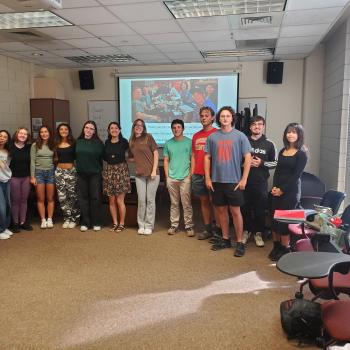Bridging Communities Through Language: First-Year Spanish Students Engage in Letter-Writing Project
By Annie Robinson
As part of the first-year Spanish language sequence, students at the University of Denver engaged in a letter-writing project that connected them with the local Spanish-speaking community. The initiative was led by Professor Robinson and was supported by the University’s Center for Community Engagement to advance Scholarship and Learning (CCESL), which funded the stamps and envelopes needed to carry out the project.
Over the course of the school year, more than one-hundred DU students wrote personal, handwritten letters in Spanish to community members served by three nonprofit organizations: Casa de Paz, Conectoras de Montbello, and CLLARO. Each of these organizations addresses social isolation in Spanish-speaking communities. Casa de Paz runs a pen-pal program for immigrants detained in Aurora's ICE in facility, while Conectores de Montbello and CLLARO provide social engagement for Latinx seniors across Denver.
Each student sent three letters, along with pre-stamped envelopes to make responding easy and accessible for their pen pals. This allowed students to apply their Spanish outside the classroom in authentic, community-centered ways. Many described the experience as the most impactful part of their first-year language sequence. One student shared that it was “one of the most enjoyable activities I’ve ever done in a Spanish class,” and said it inspired them to enroll in more courses in Spanish and Latinx Studies.
Beyond academic growth, the project made a real difference in the lives of our pen pals. One community partner with Casa de Paz, Greg Mortimer, shared this message from a detainee named Julio:
“Julio said he has received letters from two volunteers and that they are super encouraging to him. However, he does not know how to write in Spanish, so he has been unable to respond. He asked, however, if you can continue sending letters to him, as they are a bright light that brings him comfort in a dark place.”
The organizations involved expressed deep gratitude for the student engagement—especially as they face cuts to federal funding and must find creative ways to support their communities. For DU students, the project offered a transformative opportunity to build intercultural and intergenerational bridges through language, empathy, and action. Professor Robinson looks forward to serving as a mentor to colleagues who wish to integrate community-engaged language learning into their own courses in the future. She also hopes to expand the project to include in-person engagement—such as visits to the detention center in Aurora or hosting Latinx seniors on campus—continuing to deepen relationships between DU and the community we share.
